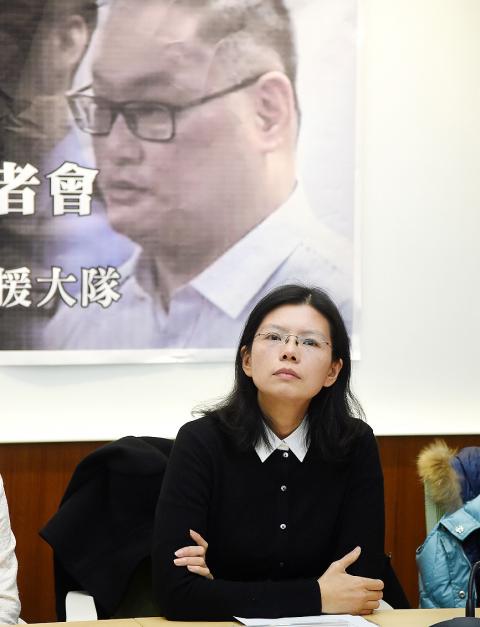Lee Ching-yu (李凈瑜), wife of Taiwanese democracy advocate Lee Ming-che (李明哲), was invited to attend US President Donald Trump’s State of the Union address last night in Washington.
US Representative Chris Smith invited Lee Ching-yu to attend the address at the US Capitol, said Taiwan Association for China Human Rights chairman Yang Hsien-hung (楊憲宏), who is accompanying her on a week-long trip to the US to raise awareness about China’s imprisonment of her husband.
Smith’s invitation underscored the weight the US places on the infringement of the human rights of Taiwanese, Yang said.

Photo: Huang Yao-cheng, Taipei Times
Tradition allows the 535 members of the US Congress to invite people to accompany them to the annual State of the Union address who symbolize policy goals and bring attention to the causes they favor.
Lee Ching-yu’s visit to the US is made in accordance with the Taiwan Relations Act, Item C, Section 2, which states that the preservation and enhancement of the human rights of Taiwanese are objectives of the US.
Lee Ming-che in November 2017 was sentenced to five years in prison after being convicted of “subversion of state power” and is serving his sentence in Chishan Prison in Hunan Province.
Following a visit to see her husband in December last year, Lee Ching-yu was last month banned from further visits until April 22 after prison officials said her comments about his mistreatment by prison authorities “deviated from the facts.”
As the Lunar New Year holiday is traditionally a time for family reunions, the association asked the public to tag Lee Ming-che on Facebook during their holiday to show him that he is not alone.
During a meeting in Washington on Monday with Lee Ching-yu, National Endowment for Democracy president Carl Gershman wrote a letter to Lee Ming-che as a show of support for him.
Among those invited by lawmakers to attend last night’s speech were Nobel Peace Prize laureate Nadia Murad.
Murad was invited by US Representative Jeff Fortenberry, while US Senator Marco Rubio invited Carlos Vecchio, Venezuelan National Assembly President Juan Guaido’s envoy to Washington.
US Senator Jeff Merkeley was to be accompanied by a Guatemalan mother and daughter who were separated at the Mexico border last year, while some Republican lawmakers invited US border patrol agents.
Additional reporting by AFP.

MAKING WAVES: China’s maritime militia could become a nontraditional threat in war, clogging up shipping lanes to prevent US or Japanese intervention, a report said About 1,900 Chinese ships flying flags of convenience and fishing vessels that participated in China’s military exercises around Taiwan last month and in January last year have been listed for monitoring, Coast Guard Administration (CGA) Deputy Director-General Hsieh Ching-chin (謝慶欽) said yesterday. Following amendments to the Commercial Port Act (商港法) and the Law of Ships (船舶法) last month, the CGA can designate possible berthing areas or deny ports of call for vessels suspected of loitering around areas where undersea cables can be accessed, Oceans Affairs Council Minister Kuan Bi-ling (管碧玲) said. The list of suspected ships, originally 300, had risen to about

DAREDEVIL: Honnold said it had always been a dream of his to climb Taipei 101, while a Netflix producer said the skyscraper was ‘a real icon of this country’ US climber Alex Honnold yesterday took on Taiwan’s tallest building, becoming the first person to scale Taipei 101 without a rope, harness or safety net. Hundreds of spectators gathered at the base of the 101-story skyscraper to watch Honnold, 40, embark on his daredevil feat, which was also broadcast live on Netflix. Dressed in a red T-shirt and yellow custom-made climbing shoes, Honnold swiftly moved up the southeast face of the glass and steel building. At one point, he stepped onto a platform midway up to wave down at fans and onlookers who were taking photos. People watching from inside

Japan’s strategic alliance with the US would collapse if Tokyo were to turn away from a conflict in Taiwan, Japanese Prime Minister Sanae Takaichi said yesterday, but distanced herself from previous comments that suggested a possible military response in such an event. Takaichi expressed her latest views on a nationally broadcast TV program late on Monday, where an opposition party leader criticized her for igniting tensions with China with the earlier remarks. Ties between Japan and China have sunk to the worst level in years after Takaichi said in November that a hypothetical Chinese attack on Taiwan could bring about a Japanese

The WHO ignored early COVID-19 warnings from Taiwan, US Deputy Secretary of Health and Human Services Jim O’Neill said on Friday, as part of justification for Washington withdrawing from the global health body. US Secretary of State Marco Rubio on Thursday said that the US was pulling out of the UN agency, as it failed to fulfill its responsibilities during the COVID-19 pandemic. The WHO “ignored early COVID warnings from Taiwan in 2019 by pretending Taiwan did not exist, O’Neill wrote on X on Friday, Taiwan time. “It ignored rigorous science and promoted lockdowns.” The US will “continue international coordination on infectious